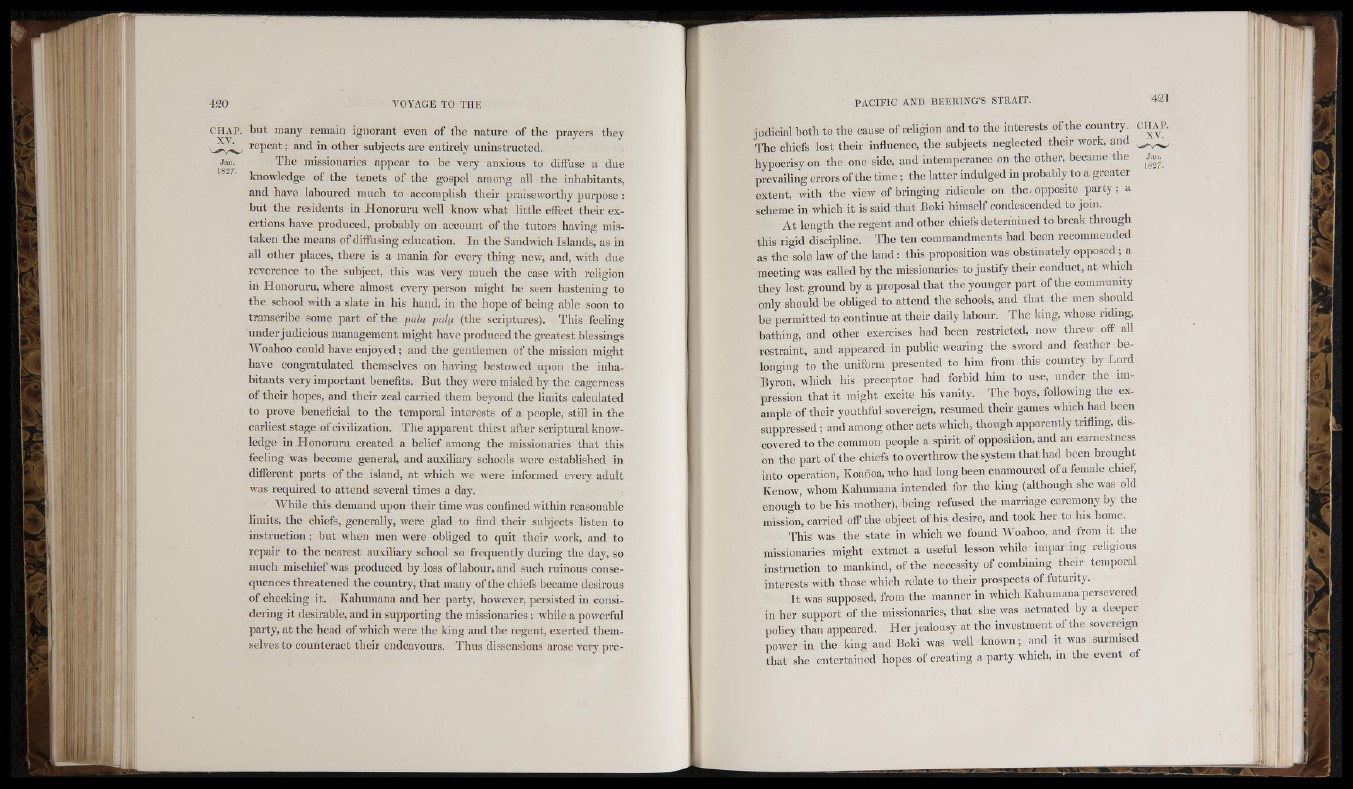
IT'
îllî" ■
tel
î ; i 'i.
C H A P . but many remain ignorant even of the nature of the prayers they
Ja».
1327.
repeat ; and in other subjects are entirely uninstructed.
The missionaries appear to be very anxious to diffuse a due
knmvledge of the tenets of the gospel among all the inhabitants,
and liave laboured much to accomplish their praiseworthy purpose :
but the residents in Honoruru well know what little effect tlieir exertions
have produced, probably on account of the tutors having mistaken
the means of diffusing education. In the Sandivich Islands, as in
all other places, there is a mania for every thing new, and, with due
reverence to the subject, this was very much the case ivith religion
in Honoruru, where almost every person might be seen hastening to
the school with a slate in his hand, in the hope of being able soon to
transcribe some part of the pala palfi (the scriptures). This feeling
under judicious management might have produced the greatest blessings
Woahoo could have enjoyed ; and the gentlemen of the mission might
have congratulated themselves on having bestowed upon the inhabitants
very important benefits. But they were misled by the eagerness
of their hopes, and their zeal carried them beyond the limits calculated
to prove beneficial to the temporal interests of a people, still in the
earliest stage of civilization. The apparent thirst after scriptural knowledge
in Honoruru created a belief among the missionaries that this
feeling was become general, and auxiliary schools were established in
different parts of the island, at which we were informed every adult
was required to attend several times a day.
While this demand upon their time was confined within reasonable
limits, the chiefs, generally, were glad to find their subjects listen to
instruction ; but when men were obliged to quit their work, and to
repair to the nearest auxiliary scliool so frequently during the day, so
much mischief was produced by loss oflabour, and such ruinous consequences
threatened the country, that many of the chiefs became desirous
of checking it. Kahumana and her party, however, persisted in considering
it desirable, and in supporting the missionaries ; while a powerful
party, at the head of whicli were the king and the regent, exerted themselves
to counteract their endeavours. Thus dissensions arose very pre-
IMi..
judicial both to the cause of religion and to the interests ofÆe country. C H A P .
The chiefs lost their influence, the subjects neglected their work, and
hypocrisy on the one side, and intemperance on the other, became the
Jail.
1827.
prevailing errors of the time ; the latter indulged in probably to a greater
extent, with the view of bringing ridicule on the, opposite party; a
scheme in which it is said that Boki himself condescended to join.
At length the regent and other chiefs determined to break through
this rigid discipline. The ten commandments had been recommended
as the sole law of the land : this proposition was obstinately opposed ; a
meeting was called by the missionaries to justify their conduct, at which
they lost ground by "a proposal that the younger part of the community
only should be obliged to attend the schools, and that the men should
be permitted to continue at their daily labour. The king, whose riding,
bathing, and other exercises had been restricted, now threw off all
restraint, and appeared in public wearing the sword and feather belonging
to the uniform presented to him from this country by Lord
Byron, which his preceptor had forbid him to use, under the impression
that it might excite his vanity. The boys, following the example
of their youthful sovereign, resumed their games which had been
suppressed ; and among other acts which, though apparently trifling, discovered
to the common people a spirit of opposition, and an earnestness
on the part of the chiefs to overthrow the system that had been brought
into operation, Koailoa,who had long been enamoured of a female chief,
Kenow, whom Kahumana intended for the king (although she was old
enough to be his mother), being refused the marriage ceremony by the
mission, carried offthe object of his desire, and took her to his home.
This was the state in which we found Woahoo, and from it the
missionaries might extract a useful lesson while impar ing religious
instruction to mankind, of the necessity of combining their temporal
interests with those which relate to their prospects of futurity.
Jt was supposed, from the manner in which Kahumana persevered
in her support of the missionaries, that she was actuated by a deeper
policy than appeared. Her jealousy at the investment of the sovereign
power in the king and Boki was well known ; and it was surmised
that she entertained hopes of creating a party which, in the event of
-Mil